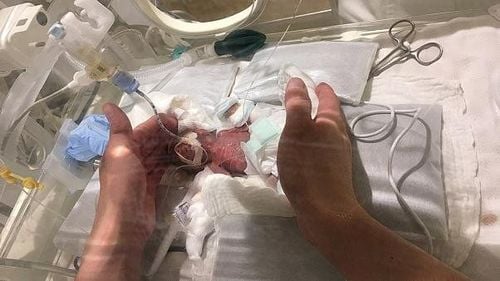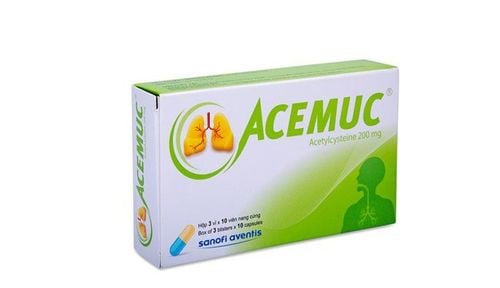This is an automatically translated article.
The article was professionally consulted by Specialist Doctor II Cao Thi Thanh - Pediatrician - Pediatrics - Neonatology Department - Vinmec Hai Phong International General HospitalA premature baby is a baby born before 37 weeks of gestation. According to estimates by the World Health Organization, every year about 15 million babies are born prematurely. And new studies show that babies born prematurely have a higher risk of asthma than babies born full-term.
1. Asthma in premature babies
Asthma is a chronic inflammatory disease of the respiratory tract, very common in children. Prolonged inflammation causes the airways to become sensitive to a variety of irritants. When exposed to irritants, the airways (usually the bronchi) become swollen, constricted, and filled with mucus, leading to congestion. And the patient shows symptoms such as cough, wheezing, shortness of breath, rapid breathing, indrawing of the chest, chest pain, fatigue,...
Normally, a pregnancy lasts about 40 weeks. Premature birth (premature birth) is the birth of a baby before the 37th week of pregnancy. Premature birth gives babies less time to develop in utero than full-term babies. The earlier a baby is born, the more likely it is to have health complications.
Depending on when the baby is born, preterm births are classified as follows:
Late preterm: Babies born between 34 - 36 weeks of pregnancy; Moderately preterm birth: Babies born between 32 and 34 weeks of pregnancy; Very Premature: Babies born before 32 weeks of pregnancy; Extremely preterm birth: A baby born before or during week 25 of pregnancy. Most preterm births are late preterm births.

Trẻ sinh cực non có nhiều biến chứng sức khỏe
2. Risk of asthma in premature babies
According to the results of a study by the Center for Population Health Sciences of the University of Edinburgh - Scotland published in the journal PLoS Medicine, scientists have concluded that premature babies have a higher risk of asthma than those born prematurely. with full-term infants.
Specifically, research shows that asthma is associated with 8% of children born at term and this rate in babies born prematurely up to 14%. Babies born before 37 weeks have a 50% higher risk of asthma than full-term babies. Babies born before 2 months are three times more likely to develop asthma than full-term babies.
Another study by American scientists at Stanford University (California) published in the March 2011 issue of the scientific journal Pediatrics showed that: Adolescents were previously born prematurely (usually from 23 weeks - 27 of pregnancy) were twice as likely to develop asthma in those born at full term.
The reason premature babies have asthma or other breathing problems is because their lungs are not yet fully functional.
3. How to take care of children with asthma
Avoiding asthma triggers, using medications, and monitoring asthma symptoms are ways to control asthma in children. Specifically:
Avoiding causes that can trigger an asthma attack: Do not expose your child to tobacco smoke, grease, animal hair, strong odors, perfumes, room sprays, mosquito sprays, or insects. incense smoke,...; Children's sleeping areas should be kept clean and tidy and should not be carpeted. Children's bed sheets and blankets should be regularly washed in hot water and dried in the sun; Do not let children play with stuffed animals; Maintain clean, fresh air in the house; Discontinue use of drugs suspected of triggering an asthma attack; Recognizing early signs that an asthma attack is coming such as coughing, wheezing, shortness of breath, chest tightness, ... to use asthma medication in the form of inhalation or inhalation; Children should be taken to the emergency room when: Asthma relievers have no effect or are short-acting, the child still has difficulty breathing, has difficulty speaking, the nostrils are fluttering, the lips or fingertips are purple,...

Tránh để trẻ tiếp xúc với khói thuốc lá
4. Measures to prevent asthma in premature babies
Pregnant women should pay attention to the following to reduce the risk of asthma in premature babies:
4.1 Avoiding secondhand smoke Prenatal tobacco smoke exposure is a risk factor for preterm birth and asthma. Therefore, pregnant women need to stay away from secondhand smoke;
4.2 Use asthma medications as prescribed Standard asthma medications are considered safe to use during pregnancy and reduce the risk of preterm babies having asthma if pregnant women take them as prescribed;
4.3 Change in lifestyle Pregnant women need to maintain a healthy weight, get regular exercise and avoid stress to reduce the risk of premature birth and reduce the risk of asthma in the baby;
4.4 Get enough vitamins and nutrients Vitamin D can be absorbed through food, supplements or sunbathing. Babies born to mothers who receive adequate vitamins have a lower risk of asthma attacks. At the same time, the lack of zinc, vitamins A, C, D, E and a diet low in vegetables and fruits is also linked to asthma and allergies in children. Therefore, to prevent asthma, it is necessary to ensure that the baby is supplemented with the necessary nutrients;

Vitamin D cần được bổ sung cho trẻ sinh non
4.5 Use caution when using antibiotics The use of antibiotics during pregnancy (especially the first 3 months of pregnancy) increases the risk of asthma in children. Therefore, pregnant women need to be careful when using the drug, only using the drug as prescribed by the doctor.
Premature babies have a higher risk of asthma than full-term babies. Therefore, parents need to pay special attention to the risk of disease to find effective asthma prevention measures for their children. At the same time, for children with asthma, parents need to take care of and treat children according to instructions so that they do not encounter dangerous complications.
Customers wishing to be examined at Vinmec International General Hospital can register for an examination at the nationwide Vinmec Hospital and Clinic system HERE.
SEE ALSO:
Distinguish bronchial asthma and cardiac asthma How to self-identify asthma Asthma Screening Package














